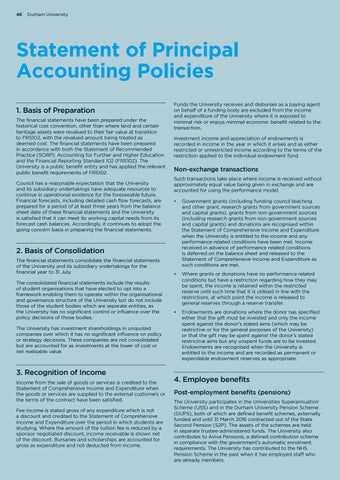46
Durham University
Statement of Principal Accounting Policies 1. Basis of Preparation The financial statements have been prepared under the historical cost convention, other than where land and certain heritage assets were revalued to their fair value at transition to FRS102, with the revalued amount being treated as deemed cost. The financial statements have been prepared in accordance with both the Statement of Recommended Practice (SORP): Accounting for Further and Higher Education and the Financial Reporting Standard 102 (FRS102). The University is a public benefit entity and has applied the relevant public benefit requirements of FRS102. Council has a reasonable expectation that the University and its subsidiary undertakings have adequate resources to continue in operational existence for the foreseeable future. Financial forecasts, including detailed cash flow forecasts, are prepared for a period of at least three years from the balance sheet date of these financial statements and the University is satisfied that it can meet its working capital needs from its forecast cash balances. Accordingly, it continues to adopt the going concern basis in preparing the financial statements.
2. Basis of Consolidation The financial statements consolidate the financial statements of the University and its subsidiary undertakings for the financial year to 31 July. The consolidated financial statements include the results of student organisations that have elected to opt into a framework enabling them to operate within the organisational and governance structure of the University but do not include those of the student bodies which are separate entities, as the University has no significant control or influence over the policy decisions of those bodies. The University has investment shareholdings in unquoted companies over which it has no significant influence on policy or strategy decisions. These companies are not consolidated but are accounted for as investments at the lower of cost or net realisable value.
3. Recognition of Income Income from the sale of goods or services is credited to the Statement of Comprehensive Income and Expenditure when the goods or services are supplied to the external customers or the terms of the contract have been satisfied. Fee income is stated gross of any expenditure which is not a discount and credited to the Statement of Comprehensive Income and Expenditure over the period in which students are studying. Where the amount of the tuition fee is reduced by a sponsor negotiated discount, income receivable is shown net of the discount. Bursaries and scholarships are accounted for gross as expenditure and not deducted from income.
Funds the University receives and disburses as a paying agent on behalf of a funding body are excluded from the income and expenditure of the University where it is exposed to minimal risk or enjoys minimal economic benefit related to the transaction. Investment income and appreciation of endowments is recorded in income in the year in which it arises and as either restricted or unrestricted income according to the terms of the restriction applied to the individual endowment fund.
Non-exchange transactions Such transactions take place where income is received without approximately equal value being given in exchange and are accounted for using the performance model. • Government grants (including funding council teaching and other grant, research grants from government sources and capital grants), grants from non-government sources (including research grants from non-government sources and capital grants) and donations are recognised within the Statement of Comprehensive Income and Expenditure when the University is entitled to the income and any performance related conditions have been met. Income received in advance of performance related conditions is deferred on the balance sheet and released to the Statement of Comprehensive Income and Expenditure as such conditions are met. • Where grants or donations have no performance related conditions but have a restriction regarding how they may be spent, the income is retained within the restricted reserve until such time that it is utilised in line with the restrictions, at which point the income is released to general reserves through a reserve transfer. • Endowments are donations where the donor has specified either that the gift must be invested and only the income spent against the donor’s stated aims (which may be restrictive or for the general purposes of the University) or that the gift may be spent against the donor’s stated restrictive aims but any unspent funds are to be invested. Endowments are recognised when the University is entitled to the income and are recorded as permanent or expendable endowment reserves as appropriate.
4. Employee benefits Post-employment benefits (pensions) The University participates in the Universities Superannuation Scheme (USS) and in the Durham University Pension Scheme (DUPS), both of which are defined benefit schemes, externally funded and until 31 March 2016 contracted out of the State Second Pension (S2P). The assets of the schemes are held in separate trustee-administered funds. The University also contributes to Aviva Pensions, a defined contribution scheme in compliance with the government’s automatic enrolment requirements. The University has contributed to the NHS Pension Scheme in the past when it has employed staff who are already members.
